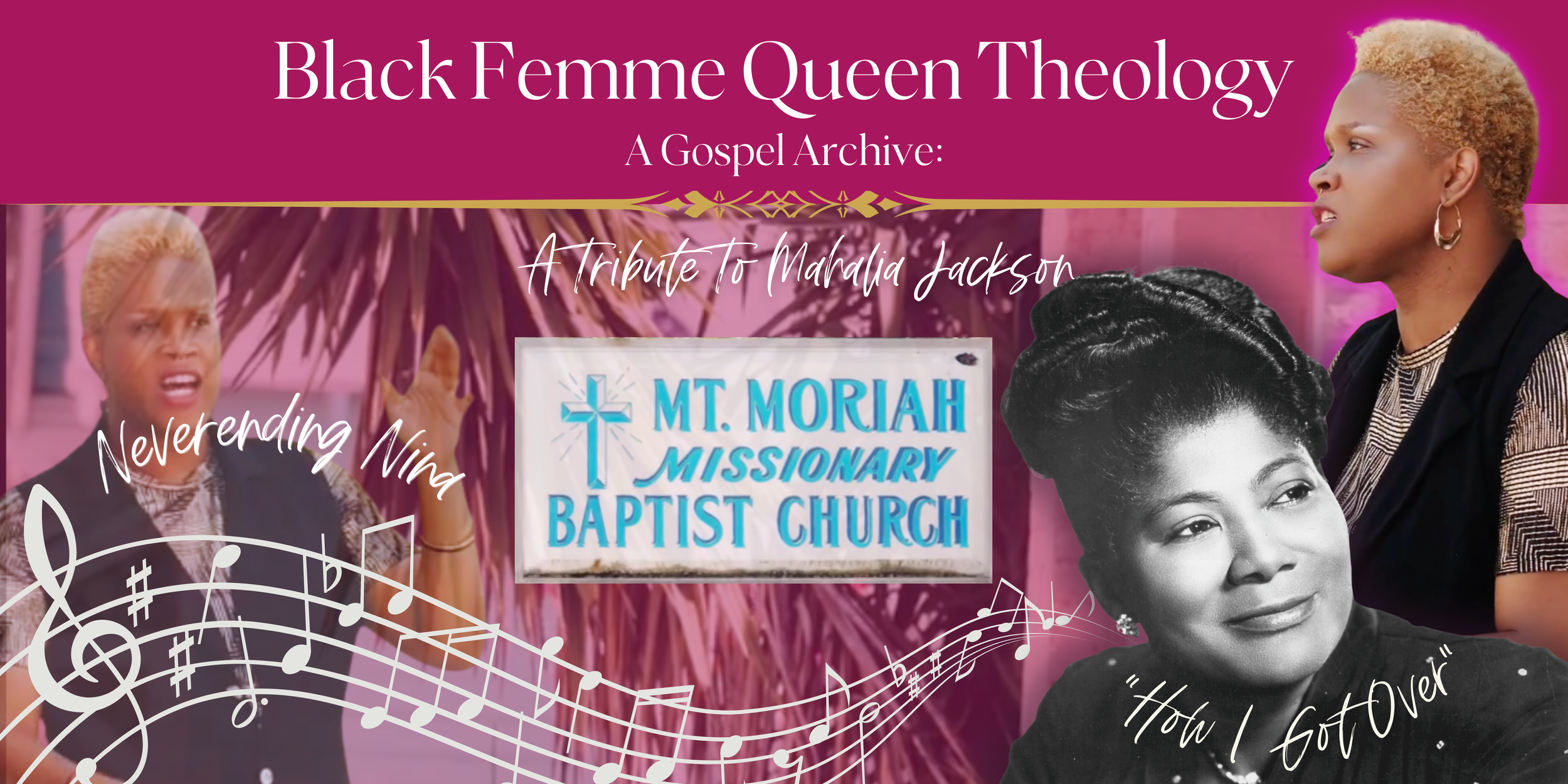A Gospel Archive: Neverending Nina Covers How I Got Over
By Minister-in-Training Nala Toussaint
Black Femme Queen Theology: Living Archive Series
Let’s Take a Ritual Pause
Okay, breathe.
Let your chest rise. Let it fall. Let Spirit settle.
It’s October 26, 2024. We’re in New Orleans, standing before Mt. Moriah Missionary Baptist Church, the historic sanctuary that once held Mahalia Jackson, the Queen of Gospel. A woman whose voice split silence and stitched it back together with hallelujahs.
And on these very steps stands Neverending Nina.
Black. Trans. Radiant. Not asking for permission. Not waiting for the Church to catch up.
Neverending Nina begins to sing “How I Got Over” ; not as a cover, but as a call to memory, to legacy, to survival.
📖 A Black Trans Body as Sacred Text
What happened that day was more than a birthday serenade.
It was an altar.
Neverending Nina sang with the same unapologetic clarity the Ethiopian eunuch in Acts 8 embodied, standing in the fullness of herself, uninvited by religious gatekeepers yet unbothered by exclusion. Neverending Nina became the text. Neverending Nina baptized the air with her presence.
“In his humiliation, justice was denied him. Who can describe his generation?” (Isaiah 53)
Like the eunuch, Neverending Nina didn’t come to be explained. Neverending Nina came to be witnessed.
Neverending Nina sang for the femmes who prayed in secret.
Neverending Nina sang for the mamas who mothered in exile.
Neverending Nina sang for the girls who dared to wear dresses and dared to believe in God.
“My soul looks back and wonders… How I got over.”
That wasn’t just a lyric. It was a resurrection.
Neverending Nina didn’t just sing about the gospel.
Neverending Nina was the gospel.
Mahalia Jackson & The Gospel Lineage
To feel the weight of Neverending Nina’s moment, you have to travel back.
In 1963, Mahalia Jackson stood at the March on Washington and lifted “How I Got Over” into the air of a world where Black dignity was still under siege. Her voice was balm and battle cry, proof that survival itself was praise.
But even Mahalia, the Queen of Gospel, never got to name the Black trans femmes who were also carrying the gospel story in their bodies.
Neverending Nina did.
On October 26, 2024, Neverending Nina carried Mahalia’s hymn into new flesh. Neverending Nina sang not just with voice, but with lineage. Neverending Nina sang it queered, unashamed, embodied — pushing gospel beyond performance into prophecy.
And that date wasn’t random:
October 26, 1866: Texas passed laws silencing Black voices from testifying in court.
October 26, 1911: Mahalia Jackson is born, the voice that helped shape a movement.
October 26, 1963: Protesters marched in Trenton, NJ for jobs and freedom, echoing gospel in their very footsteps.
Now, on October 26, 2024, Neverending Nina stood on church steps and declared:
“You will not bury me in silence. I am the archive.”
When Neverending Nina sang “How I Got Over” on Mahalia’s birthday, on church steps that once withheld us, it wasn’t just symbolic.
It was ancestral alignment.
It was spiritual interruption.
It was the story folding in on itself to become something new.
The Voices That Shaped My Spirit
I have to pause here, not just as a minister-in-training, but as someone who has always been a lover of voices.
The kind of voices that hold you in the dark, lift you in the light, and remind you that you’re not alone.
Neverending Nina’s voice is one of those voices for me. So is Angelica Ross, who speaks truth like a psalmist in a tech-age pulpit. So is Michaela Jaé (MJ) Rodriguez, whose tone carries both the resilience of ballroom and the grace of Broadway.
I think of Breanna Sinclairé, whose opera notes rise like prayers. Of Fatima Jamal, weaving gender, faith, and Blackness into one seamless tapestry.
And then Jaila Simms, Chastity Moore, Jazell Barbie Royale, Tona Brown, Destiny Hernandez, Shea Diamond; a constellation proving that a hymn can be a healing, a note a new beginning.
These women are not just vocalists. They are theologians. They taught me that a melody can be a manifesto. That a riff can be a revelation. That a song can be a sermon.
So when I write about Neverending Nina, I’m writing about all of them. All of us. Because this theology isn’t just studied ; it’s sung.
Reclaiming the Black Trans Gospel Archive
This is why Black Femme Queen Theology isn’t a trend. It’s a return.
It gathers saints who never made it past the ushers. It resurrects spiritual technologies buried under shame. It reclaims a gospel archive that has always been ours.
When Neverending Nina sang, she wasn’t just echoing Mahalia. Neverending Nina was transcending time.
To stand on Baptist church steps, as a Black trans woman, and sing a gospel that once changed the world?
That’s not just performance.
That’s canon.
That’s theology with glitter in the margins.
That’s the Book of Acts remixed by femmes who refused to stay silent.
Make This Your Altar
If you're still with me, let’s not just listen. Let’s participate.
Here’s your ritual:
Light a candle.
Pour water into a clear glass.
Say the name of someone who held you through silence.
Say your own name like it’s holy.
And whisper:
“I am the continuation of what they tried to erase.”
Let Nina’s voice hold you. Let Mahalia’s memory bless you.
Let your own survival praise itself out loud.
Citation
Toussaint, Nala Simone. A Gospel Archive: Neverending Nina — How I Got Over.
Black Femme Queen Theology: Living Archive Series, 2025.

